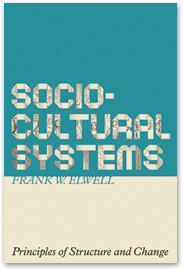
Sociocultural Systems: Principles of Structure and Change Macrosociology: Four Modern Theorists A Commentary on Malthus" 1798 Essay as Social Theory Great Classical Social Theorists In the Classical Tradition: Modern Social Theorists Dr. Elwell's Professional Page
|
rbert Spencer's Evolutionary
Sociology Marvin Harris [1927-2001] | |
|
The Cultural Materialist Research Strategy
By Frank W. Elwell
The major principle of cultural materialism, called the “Primacy of the Infrastructure,” states that “the mode of production and reproduction (infrastructure) probabilistically determines (strongly influences) political and domestic structure, which in turn probabilistically determines the behavioral and mental superstructure. Harris used to call it the principle of “Infrastructural Determinism” but too many criticized him for being overly deterministic, so he softened it some. This principle is based on a reformulation of the insights of Karl Marx (production) and T. Robert Malthus (reproduction). Harris’s unique contribution is in clearly defining both population and production variables (eliminating the “dialectic” from Marx and the moral angst from Malthus) and in combining and interrelating these two powerful forces in the infrastructure. 
The primacy of the infrastructure is a research strategy. When
attempting to explain or understand a widespread practice, event, or
belief, Harris advocates that your first step should be to look to the
phenomena’s relationship to infrastructural practices. Societies are
very stable systems. The most likely outcome of any change in the system
is resistance in other sectors of society. While the infrastructure is
considered to be of primary importance, the structure and superstructure
are not mere reflections of infrastructural processes, but are in
interaction with the infrastructure. They are capable of exerting system
maintaining negative feedback thereby deflecting, dampening, or
extinguishing most system change. The result is either the extinction of
the innovation or slight compensatory changes that preserve the
fundamental character of the whole system. But there are times when
change is rapid and fundamental--revolutionary in character. In general, sociocultural change that releases more energy from the environment is
likely to be swiftly adapted.
So while infrastructural - environmental relationships are central in
explaining sociocultural change, Cultural Materialism also recognizes
the importance of structures and superstructures in determining the
speed, and character of change.
According to Harris, there are four basic bio-psychological selective
principals: “1) People need to eat and will generally opt for diets that
offer more rather than fewer calories and proteins and other nutrients;
2) People cannot be totally inactive, but when confronted with a given
task, they prefer to carry it out by expending less rather than more
human energy; 3) People are highly sexed and generally find reinforcing
pleasure from sexual intercourse; 4) People need love and affection in
order to feel secure and happy, and other things being equal, they will
act to increase the love and affection others give them” (1979, 63).
Since we are relatively free from biological drives and
pre-dispositions, we learn the vast repertoire of human behavior through
the socialization process. So, while the needs are universal, the ways
in which societies meet these needs are highly variable. The entire
sociocultural system rests on the way society exploits its environment
to meet the bio-psychological needs of its population.
But it is not the simple calculation of the greatest good for the
greatest number of people that accounts for sociocultural change. Many
changes are more satisfying to some members of society than to others.
Infrastructural change that enhance the position of elite are likely to
be amplified and propagated
One of the first tasks of a Cultural Materialist analysis is to attempt
to identify the elite, gauge the amount of power that they wield, and
uncover their biases and assumptions when analyzing sociocultural
systems. A society’s infrastructure is the primary cause of stability
and change in its structure, and the structure, in turn, is the primary
cause of stability and change in its superstructure. That is,
infrastructural conditions are the primary causes of a society’s basic
patterns of interpersonal behavior, and these behavioral patterns in
turn call forth specific patterns of thought that justify and interpret
behavioral realities.
Ideas therefore find their origin in the concrete behavior patterns
systematically engaged in by members of a society, and these patterns of
behavior originate in conjunction with the infrastructural conditions
whereby people solve the basic problems of human existence. Ideas, of
course, interact with (promote, dampen, affect) material conditions--but
they seem to have a natural affinity for people in similar material
conditions.
The materialist approach is a means of explaining both social stability
and change. Changes in
modes of thinking ordinarily depend upon prior changes in patterns of
behavior, and these latter changes are themselves largely products of
prior infrastructural changes. Through the principle of primacy of the
infrastructure, cultural materialism provides a logical set of research
priorities for the study of sociocultural life. It directs the
investigator to begin the search for causes of sociocultural phenomena
with the examination of infrastructural conditions. It is likely that
these conditions will provide the key to explaining the phenomenon in
question. If a diligent search fails to reveal the causal impact of
infrastructural factors, an investigator then turns to the examination
of structural conditions--then going to superstructural causation. It is
a research strategy uniquely suited to exploring short-term
sociocultural stability and change -- or the long-term social
evolutionary process itself.
For a more extensive discussion of Harris’s theories refer to Macro Social Theory by Frank W. Elwell. Also see Sociocultural Systems: Principles of Structure and Change to learn how his insights contribute to a more complete understanding of modern societies.
Bibliography
Elwell, F. (2006).
Macrosociology: Four Modern Theorists,
Boulder: Paradigm Publishers.
Elwell, F. (2013), Sociocultural Systems: Principles of Structure and
Change. Alberta: Athabasca University Press.
Harris, M. (1981). America Now: The Anthropology of a Changing
Culture. New York: Simon and Schuster.
Harris, M. (1977). Cannibals and Kings: The Origins of Cultures. New
York: Vintage Books.
Harris, M. (1974). Cows, Pigs, Wars and Witches: The Riddles of
Culture. New York: Vintage Books.
Harris, M. (1979). Cultural Materialism: The Struggle for a Science
of Culture. New York: Random House.
Harris, M. (1971). Culture, Man, and Nature: An Introduction to
General Anthropology
Harris, M. (1989). Our Kind: Who We Are, Where We Came From, and
Where We Are Going. New York: HarperCollins.
Harris, M. (1968). The Rise of Anthropological Theory. New York:
Crowell.
Harris, M. (1998). Theories of Culture in Postmodern Times. Walnut
Creek: AltaMira Press.
To reference The Cultural Materialist Research Strategy you should use the following format: Elwell, Frank W., 2013, "The Cultural Materialist Research Strategy," Retrieved August 31, 2013, [use actual date] http://www.faculty.rsu.edu/~felwell/Theorists/Essays/Harris2.htm
©2013 Frank Elwell, Send comments to felwell at rsu.edu |

 throughout the system. Sociocultural
materialism is in agreement with Marx when he states: "The ideas of the
ruling class in each epoch are the ruling ideas.” The elite are able to
impose direct economic and political sanctions to get their way.
throughout the system. Sociocultural
materialism is in agreement with Marx when he states: "The ideas of the
ruling class in each epoch are the ruling ideas.” The elite are able to
impose direct economic and political sanctions to get their way.
